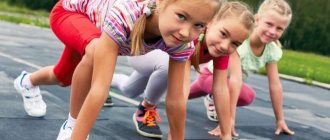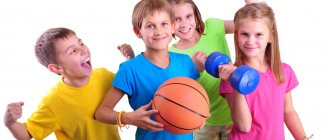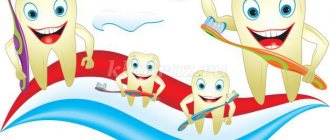Presentation for preschoolers "Healthy lifestyle"presentation
Presentation for preschoolers "Healthy lifestyle"
How to make children live in harmony with themselves, with the world around them, with people. The secret of this harmony is simple - a healthy lifestyle.
As a rule, the result of a healthy lifestyle is physical and mental health. They are closely related. It is no coincidence that people say: “A healthy mind in a healthy body.”
Slide number 1.
A healthy lifestyle is a joy for both big and small in the house, but to create it, several conditions must be met.
Slide number 2.
Health is a state of complete physical, mental and social well-being. If at least one of the components is missing, then we cannot say that the person is completely healthy.
Slide number 3.
A healthy lifestyle for a child means proper nutrition, a sufficient level of physical activity, adequate sleep, hardening, and walks in the fresh air.
Slide number 4.
What does a healthy lifestyle include?
- Maintaining a daily routine.
- Rejection of bad habits.
- Physical education class
- Proper nutrition
- Maintaining hygiene standards
- Hardening.
Slide number 5.
A daily routine is a plan of action for every day that helps you rationally allocate time and use it as efficiently as possible.
Approximate daily routine for a preschooler.
7:00 – 8:00 – getting up, exercises, morning hygiene, road to kindergarten;
8:00 – 8:30 – breakfast;
8:40 – 10:00 – gaming and educational activities;
10:10 – 12:10 – walk, games;
12:30 – 13:10 – lunch;
13:10 – 13:30 – preparation for nap;
13:30 – 15:30 – sleep;
15:30 – 16:00 – awakening, quiet games;
16:00 – 16:30 – afternoon tea;
16:30 – 17:30 – developmental activities, games;
17:30 – 19:00 – walk, drive home, play outside;
19:00 – 19:30 – dinner;
19:30 – 20:30 – quiet games;
20:30 – 21:00 – bathing, preparation for bed;
21:00 – 7:00 – night sleep.
Slide number 6.
Morning exercises are a valuable means of improving the health and education of children. Children who systematically engage in morning exercises lose their drowsy state, feel cheerful, experience an emotional upsurge, and improve their performance.
Systematic implementation of it under the guidance of an adult gradually develops in children the habit of physical exercise, associated with pleasant muscle sensations, positive emotions, and increased vitality.
Slide number 7.
Personal hygiene is a set of hygienic rules, the implementation of which contributes to the preservation and strengthening of health.
According to children's hygiene rules, you should roll up your sleeves before washing your hands. It is also necessary to properly lather and wash your hands and face, and dry yourself after washing.
To prevent disease and tooth decay, you should rinse your mouth with warm water after lunch. In the morning and evening, you need to brush your teeth correctly: upper teeth - from top to bottom, lower teeth - from bottom to top, from the outside and inside.
Slide number 8.
Hardening is a system of measures aimed at increasing the body’s resistance to conditions of cold, heat, solar radiation, especially when they fluctuate sharply; an important means of physical culture, with the help of which the body’s resistance to harmful environmental influences is consistently increased.
Results of child hardening:
- Strengthening the immune system.
- Increased tone of the whole body.
- Increased appetite.
- Ahead of peers in physical and mental development.
- Strengthening self-confidence.
- Increased stress resistance.
- Good mood.
Slide number 9.
Thorough hand washing is the first line of defense against the spread of many illnesses, from the common cold to more serious infections such as meningitis, bronchiolitis, influenza, hepatitis A and most types of infectious diarrhea.
To protect your family from bacteria, make hand washing a habit and rule for everyone, especially:
- Before eating and before cooking
- After the restroom
- After cleaning the house
- After contact with an animal, including pets
- After visiting or caring for a sick person
- After blowing your nose, coughing or sneezing
- Upon arriving home from the street (after playing on the playground, working in the garden, walking the dog)
Don't underestimate hand washing! A couple of seconds with soap can save you from several trips to the doctor!
Also, once or twice a week you need to bathe especially thoroughly (on this day you also wash your hair with shampoo). Feet should be washed not only before night sleep, but also before daytime sleep. It is especially important to follow this rule in the summer.
Slide number 10.
It is necessary to monitor the cleanliness and tidiness of clothes and shoes. If your shirt or dress gets dirty, you need to bring clean ones and change; your shoes get wet, you need to change your shoes. If you draw your child’s attention to untidiness from an early age, after a while he will begin to feel the need for cleanliness and will experience a kind of inconvenience until he puts himself in order.
It is very important to keep your home clean. This also applies to maintaining hygiene standards. It is necessary to explain to the child why it is necessary to collect toys, put things in their places, and do wet cleaning.
Slide number 11.
Physical education occupies a special place in the lives of children. Its usefulness for a growing organism is invaluable. It is necessary not only for the harmonious development of the body, but also for creating a sense of discipline. Sports instill in children such qualities as willpower, perseverance, and restraint. Physical education is needed so that the child grows up as a psychologically balanced and integral person. Physical activity has a complex effect on the entire body.
Physical education is a “perpetual motion machine” of life, which makes you active, cheerful and full of energy for new achievements.
Slide number 12.
Walking in the fresh air is important for every person, and especially for children. They have a positive effect on health and emotional state. With their help, you can improve the condition of the body as a whole.
Walking is a reliable means of promoting health and preventing fatigue, the first and most accessible means of hardening a child’s body. Finally, a walk is an element of the regime that gives children the opportunity to satisfy their movement needs through outdoor games, work processes, and various physical exercises.
Slide number 13.
The most important thing in a healthy diet is variety. Baby food should combine both animal products and plant products; both raw and cooked foods.
Slide number 14.
As a result of a lack of vitamins, the child becomes lethargic, irritable, eats and sleeps poorly. To eliminate these consequences, parents are recommended to enrich the child’s diet with fresh fruits, vegetables, herbs, nuts, grains and regularly carry out vitamin therapy for preventive purposes in the spring and autumn.
Slide number 15.
Sweets, cakes, cookies are unhealthy foods. There is no benefit from them, they do not contain vitamins and minerals, and we should not forget that sweets discourage the appetite for healthy and wholesome food. Therefore, the child should be given confectionery products very rarely, in small quantities. Sweets, moreover, can negatively affect the development of teeth.
For dessert, you should give fruits and berries more often than sweets and cookies.
Fatty meat, which is included in sausages, meat and fish delicacies, is also harmful. It is better to avoid chips, soda and fast food if you want your child to grow up healthy.
Slide number 16.
Healthy eating pyramid. The pyramid shows which products are necessary for the full development of the body. The base of the pyramid contains healthy foods that require the greatest amount of consumption and contain large amounts of vitamins and minerals. At the top are foods that need to be consumed in small quantities and with caution.
Slide number 17.
Be healthy!
Presentation “Formation of a healthy lifestyle in preschool children.” Work in the preparatory group
Maria Morozova
Presentation “Formation of a healthy lifestyle in preschool children.” Work in the preparatory group
Formation of a healthy lifestyle in preschool children . Work in the preparatory group .
It is known that preschool age is decisive in the formation of the foundation of physical and mental health . After all, it is up to the age of 7 that a person goes through a huge developmental path that is not repeated throughout his subsequent life . It is during this period that intensive development of organs and the formation of functional systems of the body takes place, the main personality traits are laid character and attitude towards oneself and others are formed. It is important at this stage to form in children a base of knowledge and practical skills for a healthy lifestyle , a conscious need for systematic physical education and sports.
Today, by a healthy lifestyle we understand the active activity of someone who wants to be healthy , aimed at maintaining and improving health .
Components of a healthy lifestyle :
-proper nutrition;
-rational motor activity;
- hardening of the body;
- maintaining a stable psycho-emotional state.
The main forms of work in kindergarten are classes, leisure, routine moments, sports competitions and holidays.
In the daily routine and activities, motor and emotional-psychological relaxation (physical education minutes, health , motor discharge, elements of relaxation) are rationally used.
In classes to familiarize themselves with the world around them, children’s ideas about man as a living being, his body and health are formed ;
about lifestyle and the dependence of health on lifestyle ;
about the influence of various factors on human health and lifestyle ;
about a healthy lifestyle ;
about human behavior that promotes health and a healthy lifestyle .
In classes on familiarization with the surrounding world with an environmental focus and practical exercises, preschool children's ideas about the conditions necessary for a person to live ; about the relationship between health and the environment.
In the course of physical education and health work, they develop the physical, mental and moral qualities of children, cultivate independence and creativity.
The program of education and training in a preparatory group for school IN THE FORMATION OF A HEALTHY WAY OF LIFE INVIGES , FIRST OF ALL, COMPLIANCE WITH A DAILY ROUTINE.
The program involves preserving and strengthening the physical and mental health of children by developing an interest in sports and physical exercise in preschoolers.
Outside, the children in our group spend a lot of time on the playground, playing with a ball, playing hoops and jumping rope.
The children themselves organize outdoor games during the walk and come up with their own.
Currently, all children in the preparatory group are preparing for the “Ball School”
, the guys stopped being afraid of the ball, learned to pass the ball to each other, run with the ball, hitting it on the floor; throw the ball into the basket.
When entering the kindergarten building, the children carefully wipe their feet on the mat and keep their shoes clean.
The guys quickly dress and undress, hang wet things on hangers to dry, and try to neatly keep things in the lockers.
The habit of properly washing your hands, wiping your hands dry, using napkins to clean your nose, and using combs is established. At the table they eat more carefully, cleanly, and have stopped crumbling bread. Thanks for the food.
In preparation for the Olympics , our group conducted a series of classes to familiarize children with Olympic sports and symbols: Olympic rings, torch.
Organization of health-preserving space : creation of psychological comfort in the educational environment , creation of a gaming and subject-development environment; ensuring the safety of children's lives ; providing conditions for strengthening the health and hardening of the body of each of them.
The didactic game “Fun Zoo”
, low mobility games
“Whose hand is higher?” “Who walks higher?”
Classes were held with the participation of parents.
The formation of a healthy lifestyle is directly related to road safety.
The children were given lessons on traffic rules, and the cartoon “Visiting Auntie Owl”
.
During the classes, children were introduced to the rules for handling electrical appliances and tools. We clarified children's knowledge about the work of the fire service and ambulance. We reinforce children’s ability to name their home address and, if necessary, call “01”
,
«02»
,
«03»
And
«911»
.
Forming the foundations of a healthy lifestyle for preschoolers ensures a high level of real health for pupils and the upbringing of a volitional culture, i.e. a combination of a conscious attitude towards the child’s health , knowledge about health and the ability to protect , preserve and maintain it.




